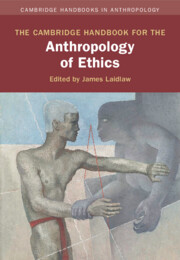Book contents
- The Cambridge Handbook for the Anthropology of Ethics
- Cambridge Handbooks in Anthropology
- The Cambridge Handbook for the Anthropology of Ethics
- Copyright page
- Contents
- Contributors
- 1 Introduction
- Part I Intellectual Sources and Disciplinary Engagements
- Part II Aspects of Ethical Agency
- Part III Media and Modes of Ethical Practice
- Part IV Intimate and Everyday Life
- 22 Care
- 23 Kinship and Love
- 24 Cooperation and Punishment
- 25 Favours
- 26 The Inimical Gaze
- 27 Animals and More-Than-Representational Ethics
- 28 God
- Part V Institutional Life
- Index
- References
22 - Care
from Part IV - Intimate and Everyday Life
Published online by Cambridge University Press: 11 May 2023
- The Cambridge Handbook for the Anthropology of Ethics
- Cambridge Handbooks in Anthropology
- The Cambridge Handbook for the Anthropology of Ethics
- Copyright page
- Contents
- Contributors
- 1 Introduction
- Part I Intellectual Sources and Disciplinary Engagements
- Part II Aspects of Ethical Agency
- Part III Media and Modes of Ethical Practice
- Part IV Intimate and Everyday Life
- 22 Care
- 23 Kinship and Love
- 24 Cooperation and Punishment
- 25 Favours
- 26 The Inimical Gaze
- 27 Animals and More-Than-Representational Ethics
- 28 God
- Part V Institutional Life
- Index
- References
Summary
A focus on care draws attention to the fact that ethical self-cultivation, even in traditions that foreground moral autonomy, relies upon relationships of dependence. The recognition of relational and ethical dependence is familiar to anthropologists and has long been central for feminist ethics. However, the enormous body of anthropological scholarship that has emerged on care over the last decade raises the question of ethical dependence anew. This chapter problematizes the concept of care. It asks: how might ‘care’ as a topic, and as engaged ethnographically, trouble some of the ways that ethical life more broadly has been conceived in the philosophical and anthropological literature? Conversely, how might attention to the ethical stakes of care trouble some of the rich ethnographic scholarship on care? The chapter draws most substantially on anthropological and philosophical scholarship in virtue ethics and in phenomenology to consider both the relational complexities of care and care’s ineffable and elusive ethical dimensions.
Keywords
- Type
- Chapter
- Information
- The Cambridge Handbook for the Anthropology of Ethics , pp. 561 - 590Publisher: Cambridge University PressPrint publication year: 2023



